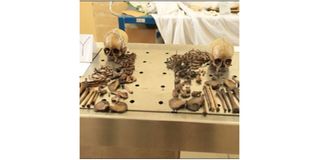Forensic exhumation a big challenge for Tanzanian medics

What you need to know:
- A forensic expert proposes the establishment of a government chief pathologist's office that will be responsible for overseeing forensic pathology and related medical services
Dar es Salaam. Although the law requires ‘government’ medical practitioners to perform forensic exhumation and human remains identification when necessary, the majority of them lack the necessary expertise in medico-legal investigation.
Speaking exclusively to The Citizen, Mr Wilson Jilala, a forensic expert from the National Museum of Tanzania, said the matter is fuelled by the fact that the country’s medical training curriculum does not offer such.
“It is unfortunate, the medical training curriculum in Tanzania for many years did not offer any courses of forensic exhumation and identification of human skeletal remains,” the forensic expert noted.
Mr Jilala explained that all forensic operations were undertaken by the Criminal Investigation Department (CID). Even after independence there was no special law governing post-mortem examinations of corpses during the police investigation until 1980 when the Inquest Act was enacted.
Moreover, after the law was passed, it stated that the matter of post-mortem examination during the police investigation would be done by medical practitioners. In his study dubbed: ‘Forensic exhumation and human remains identification: A gap between the Inquest Act 1980 and medico-legal education in Tanzania’, the forensic expert urged that the medical curriculum was not updated to accommodate appropriate sections to meet the legal requirements.
As a result, the gap between legal requirements and medicolegal practices for medical practitioners in Tanzania was created, thus a challenge to medical practitioners who lack exhumation skills and human remains identification techniques.
For instance, in his study, Mr Jilala recalled an incident in Kawe suburb whereby a pastor was reported missing and almost a month later, his body was found buried in a bush - Mabwepande in Dar es Salaam.
According to him, a medical practitioner who was charged with both the ‘exhumation order’ and ‘post-mortem order,’ admitted that he did not have sufficient expertise to perform the exhumation and autopsy work on a decomposing corpse.
The exhumed body was damaged which would be difficult for a medical doctor to establish the physical trauma in the soft tissues, but the presence of an experienced anthropologist with knowledge in examining cadavers and skeletonised human remains, helped in identifying the perimortem trauma that may have caused the death. “There was another case involving an exhumation of commingled human remains,” said Mr Jilala. Adding: “Three children were murdered and then dumped in a garbage pit along the road. A year later after being reported missing, bones believed to be human were discovered.”
Police visited the area and then called a medical doctor to examine the remains, but after his arrival at the crime scene, he established that the investigation could not be done by an ordinary medical doctor and advised that a forensic pathologist should be involved. The most recent case was December last year where the exhumation was ordered following an illegal unearthing of the grave of an individual with albinism by people with malicious intentions.
After a thorough police investigation the criminals were arrested (red-handed) selling a human tibia. In order to establish the evidence beyond any doubts in the court of law, the bones found triggered an exhumation order, thus directing a medical doctor to collect DNA samples for comparative work and reference-identification.
Furthermore, the medical doctor placed the samples in two separate containers and preserved them with formalin, the efforts to preserve the samples in formalin actually destroyed most of the DNA evidence required in identification.
“No pun intended, the doctor unknowingly destroyed the DNA evidence (base modification and cross linkage between DNA and proteins). Consequently, the samples could not be used for genetic testing and the exhumation and sampling exercise had to be repeated after two weeks,” the article reads further.
Therefore, Mr Jilala urges the establishment of the government's chief pathologists' office that will be responsible for overseeing forensic pathology or medical services including Forensic osteology (archaeology and anthropology).
He also thinks either the ministry of Health or ministry of Home Affairs, should have a special forensic pathology service unit that will be responsible for supervision, ethical practice, accreditation, risk management and other important matters to be considered during the provision of forensic services.
And as far as improving curriculum challenges, Mr Jilala said in his study: “There is no alternative to solving these existing challenges, health colleges have the reason to establish degree programmes in forensic pathology or medicine to address this emerging challenge."




